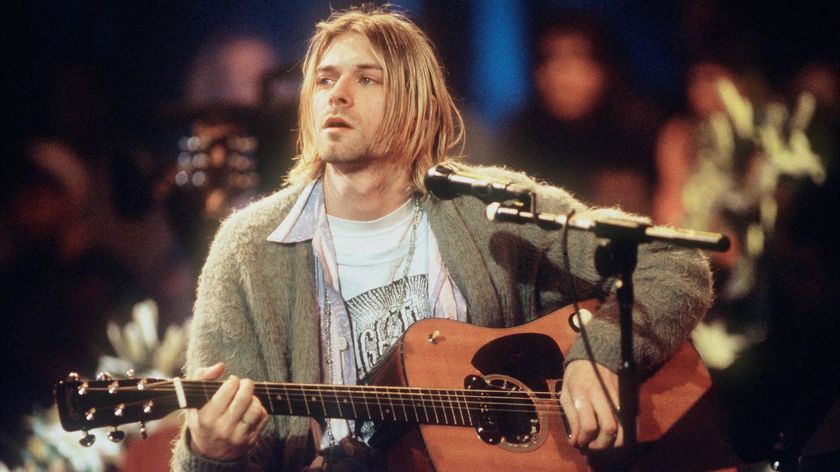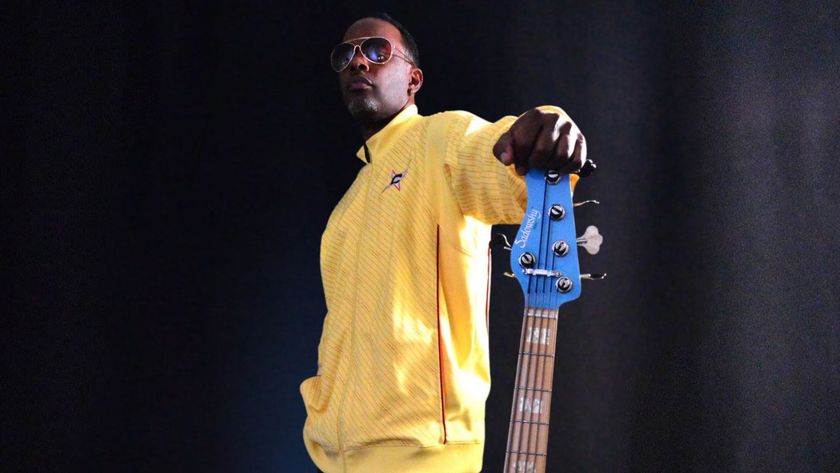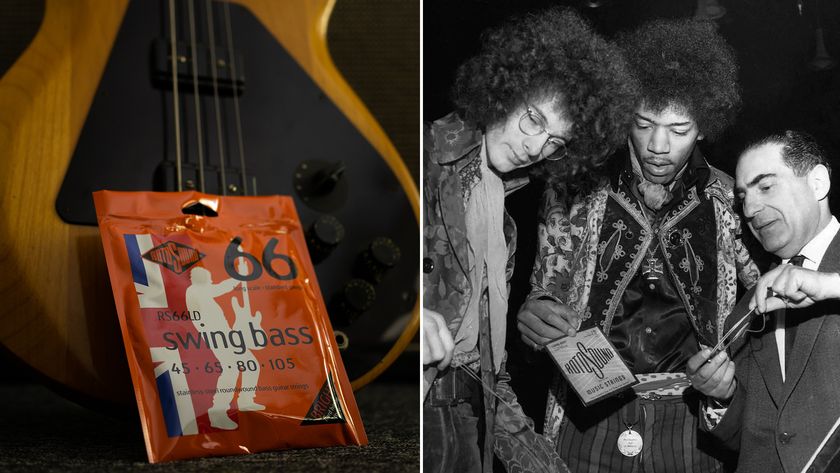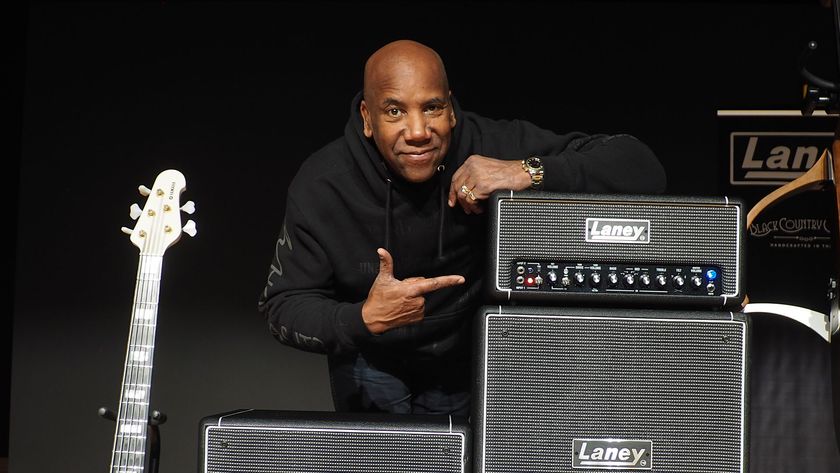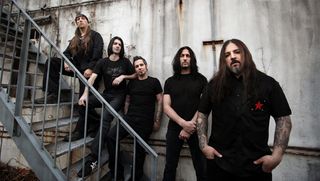
To those of you paying attention in the metal world, Sal Abruscato should need no introduction. Those of your with your heads up your -- er, under a rock -- would be wise to get to know the man's discography, which includes drum credits on classic albums like Life of Agony's River Runs Red and Type O Negative's Bloody Kisses.
Regardless of your familiarity with the man's body of work, most of you still probably know Sal as a drummer. Little did any of us know that Sal has been quietly picking up guitar and bass over the past couple of decades as well.
When Life of Agony hit a lull and Sal was left to his own devices, he started writing songs, which he would share with friend and former Suppermassiv bandmate (and GuitarWorld.com columnist) Matt Brown.
"I had recorded this onslaught of songs," Sal recalls, "and when [Matt] would come over to hang out, I would be like, 'Matt, check this out.' Next time he came over, I'd say, 'Matt, check this out' until we had enough song ideas that we knew we had to re-record them."
These songs became the debut album from A Pale Horse Named Death, so far receiving rave reviews from most hard-rock and metal outlets. On And Hell Will Follow Me, Sal and his producer/engineer extraordinaire cohort have crafted a grungy, apocalyptic collection of hard rock songs that embrace doom and gloom like Poison embraced hair products.
Sal and Matt stopped by Guitar World HQ recently to talk about And Hell Will Follow Me.
GUITAR WORLD: Was this ever supposed to be your "solo" album where you take on the Trent Reznor role of doing everything, or did you know you wanted Matt on board from the beginning?
Get The Pick Newsletter
All the latest guitar news, interviews, lessons, reviews, deals and more, direct to your inbox!
SAL ABRUSCATO: No, I was hounding Matt from the very beginning; I wanted only Matt to be involved just because we work so well together. You know we've known each other for 20 years, we had a band back in 2005 called Supermassiv and we always mentioned that one day we were going to do something together again, because we just enjoy each other's company.
It was just a matter of time and timing, but he was on my mind the whole time for this project. He would say, "Just keep writing, Sal; don't stop, just do your thing," until the point where I had 16 or 17 songs and then we knew it was time to actually drop the hammer and create a plan to re-record everything.
Talk a little about the your gear set-up on the album.
MATT BROWN: Well, is was pretty minimal, actually. We used a Mesa Rectifier head with a 2x12 Marshall cab, a couple mics -- a [Shure SM]57 and Rogue NT1A -- nothing crazy, really. But we really used our ears and just honed in on the tones that way, and just used the talent of just listening. A lot of people get too technical and want to use some special miking technique ...
SAL: Less is more.
MATT: We were just worried about the end result, "Does it sound good?" And that's what we went with.
Was the recording process analog, digital or a mix?
MATT: It was digital. Pro Tools. No crazy plug-ins or anything. Like I said, just lay the sound down, get the tone right the first time from the microphone, and hit "Record."
SAL: It's the source that matters. Not, "We'll layer it later" and crap. I'm a true believer, as is Matt, that we don't need all these processors, these effects. We just use straight-up, organic gear.
MATT: What really made it enjoyable and easy is that Sal is really proficient in what he does as a guitar player. I know that's weird to say, because Sal's known as a great drummer, but as a guitar player, he really nails it every time. We did minimal work as far as re-tracking goes. We had to do three takes ... maybe once, maybe. We didn't really beat this thing to death.
That made it a really enjoyable experience for me as an engineer and for him as a guitar player. It just kind of worked that way.
One thing that really stuck out to me was that awesome-sounding intro on "Die Alone." How did you create that?
MATT: That's a really cool subject, actually. Sal was recording directly into a laptop making scratch tracks, and he had called up some effects within the computer -- just basic stuff within GarageBand -- and it just sounded cool. And we kept it.
Like I said, it goes back into, "If it sounds cool, don't worry what it is, it sounds cool."
Do you remember what exactly it was that you called up?
SAL: I could probably find it again. Sometimes it doesn't matter what it is; it just sounded good so we were like, "Let's just keep it."
Sal, how has the reaction been to your guitar playing? Have you had a lot of people surprised that you play guitar?
SAL: Yeah, you know I get that same question all the time, and everyone's been surprised. But it's something I've been noodling with for a long time. I started tinkering in the early '90s; I was basically in my house playing all the time. All these years I've been working up to where the writing is on point, but working in the privacy of my own home. I would prefer to play guitar to playing drums because at home I didn't have a drum set.
It took time, though, and it took courage to finally say, "Stop dreaming about it," because I've wanted to do something like this for years -- to do a record with no objections and no interference, no four or five guys in a room disagreeing. I'd been there, done that, didn't want to do it any more.
I just wanted to go for it. It was time to give it a shot.
Do you prefer working like this to the full band dynamic?
SAL: Yeah, yeah. It's very addicting, actually.
The album has this great apocalyptic, doomy vibe that is somewhat different than anything you've done before. Have you found that fans of Type O and Life of Agony have embraced the album?
SAL: Moreso the Type O fans. Life of Agony music and Life of Agony fans, I guess, are more hard-rock-oriented. There wasn't really any doom and gloom.
This really is me going back to my roots, because I really enjoy playing that kind of stuff. That's kind of why I got into a band with Peter [Steele, late Type O Negative singer]; I liked all that Sabbath influence and even stuff like Sisters of Mercy and all that goth stuff he was listening to -- [My] Bloody Valentine, Cure, Depeche Mode -- just that whole vibe. I just liked it when it was happening back in the '80s, so I really always wanted to get back to that.
I like the dreariness, I like slow and sometimes just dwelling on a note and because of that, Type O fans go, "Oh shit! This is dark and slow and dirgy and depressing," and they seem to be giving a lot of love and embracing it moreso.
Let's get into some of the inspiration behind the individual songs. Was this all from experience, some philosophizing ... ?
SAL: Really a bit of both. The song "As Black As My Heart" is a vague depiction of when I was going through a divorce during the album process. I wrote the song literally days after the so-called-person left me.
And then there's a little bit of fantasy, where "To Die In Your Arms" is about someone who just wants to commit suicide and die in their girlfriend's arms.
What's the song "Heroin Train" about? I know you've had more than your fair share of experience with friends succumbing to addiction.
SAL: "Heroin Train" was about my experiences having a few friends pass away from overdoses, having friends that have family that are on heroin and then what I saw visually coming into the Lower East Side of New York, hanging out in the city and just seeing young people -- addicts -- living homeless in the park, prostituting themselves -- whatever it took to get a fix. Those visions, for some reason, stayed with me for 20 years.
How about "Devil In The Closet"?
SAL: "Devil In The Closet" relates to the feeling everyone has as a kid when your mom makes you sleep in your room alone at night and you have all these crazy fears 'cause your imagination is just running wild and you've got this closet and it's dark. If that closet's left open, you start seeing stuff because it's dark and you're a scared child with a vivid imagination. You just terrorize yourself, basically.
I know I was terrified of that closet as a kid. I used to always say, like, "Mom, make sure the closet's closed." I would freak out; I thought there was somebody in there.
What's the next tune? "Cracks In The Walls" came from me sitting in my house alone for three days not eating, not talking to anyone and barely sleeping -- just sitting in my living room with the lights off just staring at the wall because I was dealing with this whole big, giant change in life where it was just crazy shit going on. And I was just staring at the wall, and my eyes started to pick up a crack here and there, and it just started coming together in my head as a song about someone who goes insane from seeing stuff -- but it's all their head.
Let's do one more, what's the song "Bath In My Blood" about?
SAL: It's about, you know, the multi-personalities that live inside me; I have about three in me. That's why one day I'm this way the next day I'm that way.
MATT: I can attest to that.
SAL: I've got like three bitches inside me, and they drive me crazy 'cause we actually argue with each other. So that's what the song "Bath In My Blood" is about.
The album art really sets the tone for the record. Talk a bit about the artwork, because so far this has to be one of the best album covers of the year.
SAL: Sam Shearon from London. He's wanted to do something with me for probably four years; we sort of befriended each other. When this came up, I hit him up, told him I had this project going on and it was really dark. And while the artwork was going on, I was sending him lyrics so he could actually understand everything, do each song's piece of artwork -- and we went back and forth a little bit. But I would say out of the gate he pretty much hit it 90 percent on the head.
What was the inspiration for all of the apocalyptic imagery?
SAL: What was the inspiration? It's just some dark-ass music [laughs]. For the cover, A Pale Horse Named Death is original yet very familiar, as in Revelations, death rode a pale horse and hell followed him. And because there's that biblical connotation in there, I think that's why people gravitate toward the name; it sounds like something they already know, but it's a little bit different.
MATT: It's really great when you work with people who get it on every level -- on the imagery, the music -- it just works so much easier. There's no bickering, there's just creativity.
Speaking of the apocalypse, I'm guessing you guys are glad the world didn't end this past weekend.
SAL: Ah, it's just a bunch of baloney. I didn't believe one word of it. This whole 2012 thing ... it won't be the end of the world. If anything, the human race might go extinct, but the planet will continue to exist long after us, rebuild itself -- probably become a better place -- and our infrastructure, which only has about a 50-year lifespan, will crumble and disintegrate. In a matter of a couple hundred years, it'll all be overgrown.
So the planet will just wash itself of all the parasites and bloodsucking ticks that we call human beings. The dinosaurs had a longer reign on the planet than we did; we're just a microfiber in the geological time frame. We're a sliver, a blink of light.
There's something egotistical about people's fascination with the apocalypse, almost as if to say, "If I die, then it has to be the end of everyone and everything else in existence."
SAL: We're so egotistical, we think that if we go then the whole planet goes and every species will go with it. That's why people feel compelled to save the planet. You know, we're contributing to stuff going wrong on the planet, but the planet is a bigger force than us and it will manage to find a flaw in our evolution and we'll just weed ourselves out.
-GW
A Pale Horse Named Death will release their debut album, And Hell Will Follow Me on June 14. Keep an eye out for a special "Introducing" on A Pale Horse Named Death in the August issue of Guitar World. magazine.
Josh Hart is a former web producer and staff writer for Guitar World and Guitar Aficionado magazines (2010–2012). He has since pursued writing fiction under various pseudonyms while exploring the technical underpinnings of journalism, now serving as a senior software engineer for The Seattle Times.
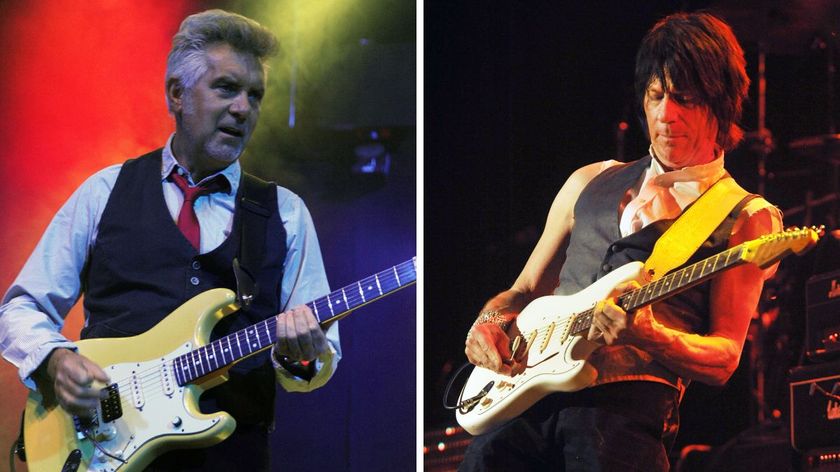
“Jeff was playing through his dodgy Marshall and didn’t like the sound. He said, ‘We’ll do it again, later on…’” Mick Rogers may be in possession of Jeff Beck’s last-ever studio recording

“I could try and recreate his vibrato for the rest of my life. It’s never going to happen. If I got to play his guitar through his rig, it’s not gonna sound like him”: Tony Iommi changed his life – now Scott Ian is playing Sabbath’s last stand

